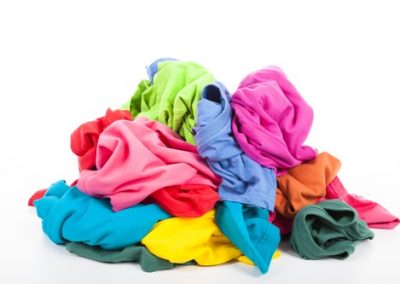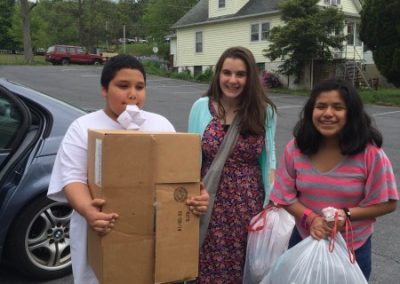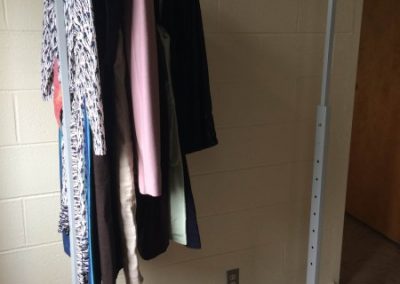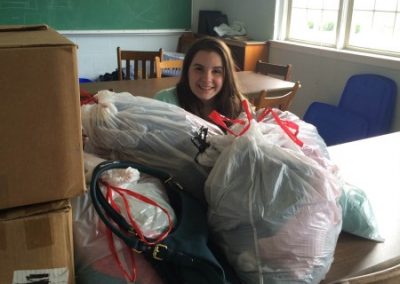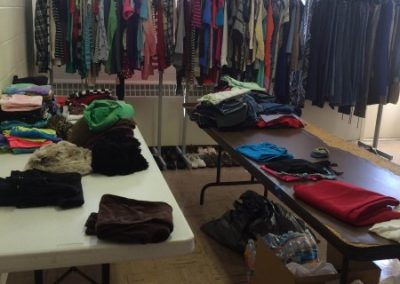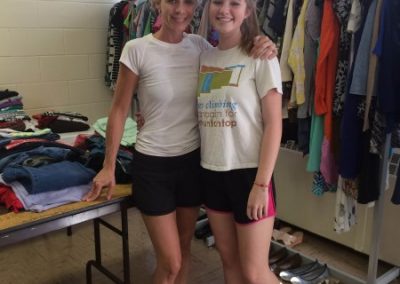THE GREEN HANGER PROJECT

Caring for Students in Need
On any given day, approximately 160,000 American students skip school because they are being bullied — often because of their appearance (See “Sierra’s Story”). Some students drop out of school to avoid being bullied, while others even commit suicide to escape the torment. We work to stop that by building self-esteem and
We work to stop that by providing some of the things students need in order to help them build their self esteem.
For Students in Need:
The Green Hanger Project organizes collections of new and gently-worn clothing, shoes, coats, and accessories as well as personal care products and school supplies for middle and high-school students.
We then give these to not-for-profit organizations for distribution to needy and at-risk students in our communities.
We never sell the clothes or products we collect, instead we make sure they get in the hands of students who need them.
For Those Who Want to Help:
We also provide volunteer opportunities for compassionate students and adults designed to foster a sense of community and provide a network of support for students who are often targeted by peers engaging in bullying behavior.
Through our work together, we empower students and adults to change the culture of bullying, replacing it with one of compassion, by equipping them to stand firm on a foundation of love and peace in the face of injustice. We are finding that lives — and communities — are being changed in the process.
Despite being the fastest runner anyone in their community had seen, the best first baseman, and having the sweetest three-point shot, Ben* dropped out of school his junior year – not because of his grades (he carried a 3.65 GPA) but because of his feet. Ben’s parents struggled to keep their rapidly growing son in clothes, and simply could not afford the specialty footwear he needed to play the sports he loved.
In 10th grade, he traded sports for a job to help his parents pay rent and put food on the table for his three siblings. Before his junior year was over, he traded school for work in a local factory. Even his guidance counselor had no idea that Ben would have stayed in school – and likely earned a college scholarship – if he had been able to afford the shoes he needed.
*These are our students’ stories. We’ve changed their names and combined some of their stories to protect them, but these are real kids with real needs – and there are thousands more like them. They live in our community – and yours, too.
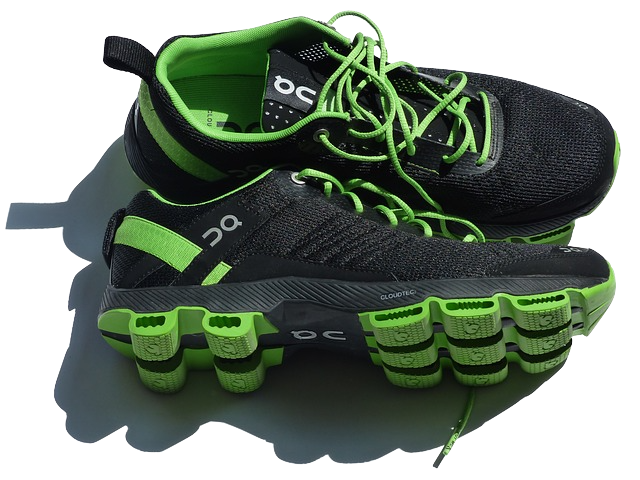
We know students who share shoes with siblings and parents – even though the shoes do not fit. We work with students who wash the few clothing items they own – and their bodies — at school because they do not have water in their homes or money for the Laundromat. We care for students in need so that they have a few less things to worry about and can spend that time focusing on their education.
We can’t do this without you. Won’t you help us? All it takes is sharing what you already have or making an extra purchase or two.
If you have kids, you either have clothes or need clothes. We accept clothing and other items from people with more than enough and give it to people with very little.
Don’t let a child’s future slip through your fingers.
- Start a clothing drive among your family, friends or neighbors.
- Sponsor a community clothing drive
- When you buy socks, underwear, or personal care products, buy one for you and one for a student.
- Host a back-to-school and personal-care-product supply drive
With only weeks left before her high-school graduation, Sierra* stopped coming to school. Her teachers and school administrators couldn’t figure out why. Sierra was a solid student who was well-liked, had a close circle of friends, and seemed to be quite confident of herself. What they didn’t know was that for years Sierra had been bullied by a small group of girls who targeted her because of her sweat pants.
No one knew Sierra had only two pairs of sweat pants, a few tee shirts, and flip flops to wear to school – regardless of the weather. They didn’t know that she would sneak back into school when there were evening events to wash her clothes and her body. They had no clue that the cinch sac she carried every day contained everything she owned.
*These are our students’ stories. We’ve changed their names and combined some of their stories to protect them, but these are real kids with real needs – and there are thousands more like them. They live in our community – and yours, too.
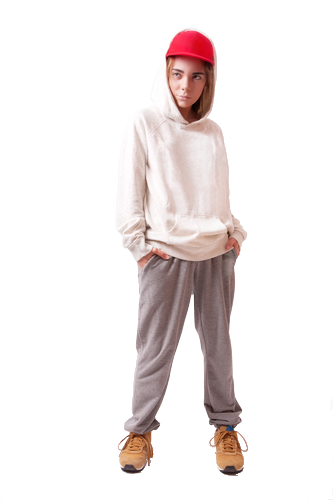
- Are you a middle- or high-school student?
- Do you have children or grandchildren who are still in middle- or high-school?
- Do you have a neighbor who has children or grandchildren who are in middle- or high-school?
- Do you live in a neighborhood with school students?
- Do you buy personal care products?
You are part of the solution!
Sam* and Jack* have always been part of the “in” crowd. They shopped at the “right” stores, wore the “right” clothes, spent hours after-school studying at Starbucks and hanging out at the mall. On weekends, they went to the “right” church.
Eight months ago, their dad lost his job. Now, they are moving in with their grandmother and their dad is moving out of state to take another job. There are no more Starbucks or name-brand clothes, and the friends with whom they used to spend all their time seem to have vanished.
Their mom struggles to provide the things they need, but they haven’t been to the orthodontist in months and Sam’s braces are in need of repair.
Sam auditioned for and was accepted into her school’s honors chorus, but knew her mother didn’t have the $75 for the required dress. She declined the invitation to join.
When Jack discovered he needed a $120 scientific calculator for an Advanced Placement Calculus class, he dropped the class rather than ask his mother for the money.
*These are our students’ stories. We’ve changed their names and combined some of their stories to protect them, but these are real kids with real needs – and there are thousands more like them. They live in our community – and yours, too.
- Fashionable new and gently-worn clothing, shoes, coats, and accessories SUITABLE FOR STUDENTS AND TEENS. Used clothing must be washed before being donated and should be free of stains and holes.
- New under garments: briefs/boxers, panties, bras, etc.
- New socks
- New, un-opened personal care products: shampoo, conditioner, hair-care products, bath soap and gel, shaving cream and razors, toothpaste and tooth brushes, deodorant, skin-care and acne-care products, makeup and applicators/brushes, nail polish and remover, cotton balls and swabs, perfume and body spray, etc.
- School supplies: back packs and book bags – particularly for middle- and high-school students, binders (2 1/2-3 inch), scientific calculators, filler paper (college ruled, please), pencils, mechanical pencils, pens, glue sticks, colored pencils, etc.
Please note that donated items that are not suitable for students and teens will be distributed to local charities serving adults and senior citizens.
Where
Donations can be mailed to or dropped off at:
The Green Hanger Project, 77 Hamshire Way, Fishersville VA 22939.
Financial contributions should be made payable to:
“Staunton District UMC” and labeled “Green Hanger Project” in the memo field.
Please mail to: The Green Hanger Project, c/o Staunton District UMC, 26 Orr Drive, Fishersville VA 22939
Charitable donation receipts are available upon request. Contact Us for more information.
The Green Hanger Project is an ecumenical outreach program affiliated with the congregations of the Staunton District United Methodist Church, tax ID: 54-6049295. Contributions may be tax deductible; see your tax professional for details. For memorial contributions or honorariums, please include the honoree’s name and an address to which a notification of gift can be sent.
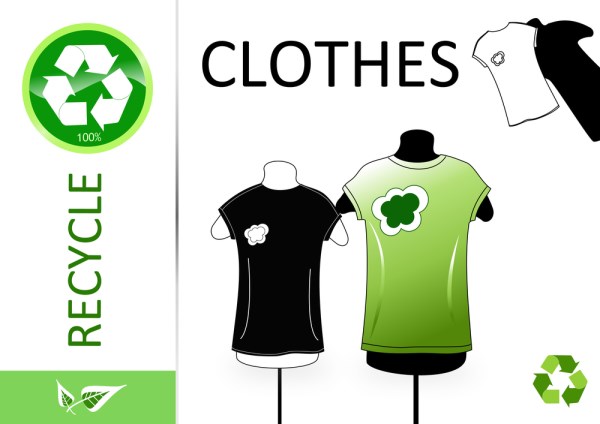
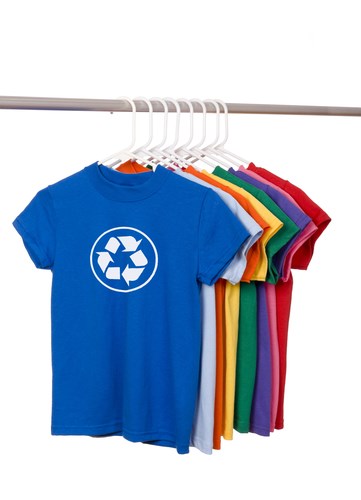
Want to host a Green Hanger drive? Email us
His teachers and friends don’t know that he keeps one mechanical pencil he “borrowed” hidden under a baseboard at his house so he can do his homework. They don’t know that two years ago Javier’s parents fled Honduras with him and his two younger siblings after his older brother was murdered for not agreeing to smuggle drugs for a local drug lord.
The sixth-grader remembers the drought that killed the crops his family grew and sold in the market in their small village. He remembers living under bridges and scavenging from the dump in the large cities after famine forced his family and hundreds of others like them to move from the countryside.
He remembers the sight of his brother’s lifeless body being dumped under the bridge, and his mother’s grief-stricken cries. He remembers walking for months under the cover of darkness, and crossing a desert to come to America, where his parents assured him the government didn’t support drug lords and kind people would help them build a better life.
Now, he lives in a two-room house with three other families. There is no electricity or water. His parents go to work before sunrise and come home only to sleep for a few hours. He and the older children in the house care for their younger siblings, cooking meager meals and often going without food when there isn’t enough to go around.
Javier can’t see well, but he doesn’t realize it. He has never been to a doctor as his parents are afraid their status as undocumented residents would be discovered and reported. Javier and his family will do anything to avoid being sent back to Honduras, for they know that once they cross the border they are as good as dead.
Javier studies hard and makes good grades so he is prepared to help the younger children for whom he cares. He loves going to school and makes the most of each day there, because he knows in a few years he must quit school so he can help his parents make a better life for his little brothers.


We seek out partners who are able to get the items we collect into the hands – and book bags – of students in needs.
Our partners include homeless shelters, clothing closets, soup kitchens, after-school literacy programs, mentorship programs that serve teen-aged mothers and their children, and school guidance departments. We are constantly seeking out effective partnerships.
Too often, people drop bags of clothing in bins advertising that the goods will be used to fund educational initiatives in the community, or they donate clothing to not-for-profit organizations that re-sell these items. They do not know that much of what they donate is sold, by the pound, to companies that turn these items into rags or sell them to businesses overseas. The bulk of the money raised from the sale of donated clothing never makes back to the community, and very few – if any – of the items donated are used to help local students.
These practices have dramatically cut the amount of clothing available for low-income students. Many clothing closets now struggle to keep their racks stocked with gently-worn, quality pieces. Students who rely on these closets are finding that what is available is often stained, worn, or out-of-style.
As for not-for-profit resell businesses, they are often frequented by bargain hunters looking for brand-name merchandise at deeply discounted prices. Often times, these shoppers can afford to shop elsewhere but enjoy the thrill of securing a bargain. Because they can afford to shop frequently, they often get the “good stuff” before students who could really use these items.
In many cases, students and their families do not have enough money to shop at these stores, much less anywhere else.
We collect clothes for them, find like-minded partners, lessen the strain of poverty on students and put an end to appearance-based bullying and shame.
Contact us: email


